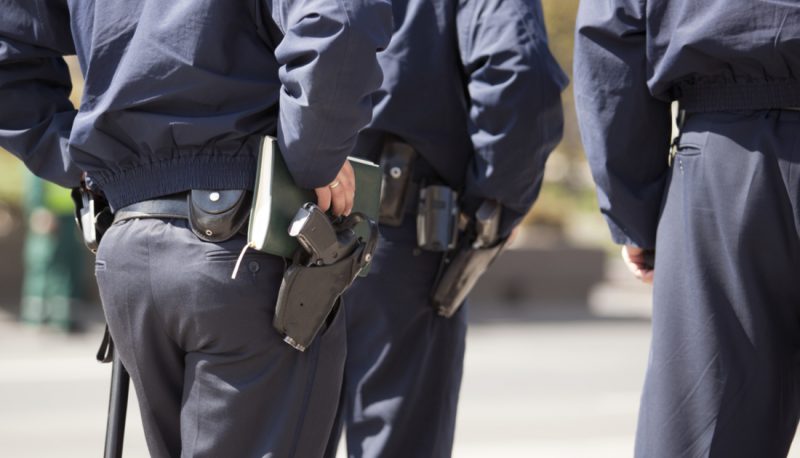“Confirmed Judges, Confirmed Fears” is a blog series documenting the harmful impact of President Trump’s judges on Americans’ rights and liberties. Cases in the series can be found by issue and by judge at this link.
Trump Ninth Circuit judge Kenneth Lee argued in dissent that the court should reverse a jury verdict of over $3 million against police for “loss of life” damages because they wrongfully choked and killed an unarmed man who was doing nothing wrong. The majority rejected Lee’s arguments and affirmed the jury verdict in its August 2021 decision in Valenzuela v City of Anaheim.
Two Anaheim police officers responded to a 911 call about a “suspicious person” near a city laundromat, although the dispatch did not suggest he was armed or was engaged in any criminal activity. When they arrived, they saw Fermin Valenzuela and followed him into the laundromat, where they saw him moving clothes from a bag into a washing machine. One heard the sound of breaking glass and saw a methamphetamine pipe, and asked Valenzuela whether he was alright. Valenzuela responded that he was fine and just trying to wash his clothes.
One officer claimed he saw a screwdriver in the bag, and ordered Valenzuela to stop and put his hands behind his back. Valenzuela moved away from the bag but when he did not quickly enough put his hands behind his back, one officer grabbed his right arm and tried to do so and the other put him “in a choke hold.” The three struggled, the officers knocked Valenzuela “to the floor, face down,” and applied a second choke hold. Valenzuela started “turning purple” and repeatedly screamed “I cant breathe,” and one of them tased him. Valenzuela somehow got to his feet and ran, followed by the officers chasing him, pushing him” to the ground” and tazing him and putting him in another choke hold. He somehow started to run again, begged the officers “don’t kill me,” and fell to the ground. The officers put him in yet another choke hold, and Valenzuela again “turned purple” and repeatedly shouted “help me” and was “audibly gasping for air.” The officers maintained the choke hold for around two minutes, with the encouragement of a supervisor, and Valenzuela “fell into a coma and died eight days later.” The medical examiner ruled that the death was a “homicide caused by complications of asphyxia.”
Valenzuela’s children and his father filed suit under both federal and state law for “excessive force” and “wrongful death.” After a trial, a jury agreed with the Valenzuela family and awarded them $3.6 million for the ’loss of life” of their father and son, as well as $9.6 million for Valenzuela’s pain and suffering and for his children’s loss of his ‘love” and “companionship.” The city and officers argued, however, that the judge should reverse the “loss of life” verdict because state law did not recognize “loss of life” damages and neither should federal civil rights law.
The district court rejected that claim, finding that the federal civil rights law (42 US Code sec 1983) does allow for such relief, and that ruling for the defendants would “undermine the vital constitutional right against excessive force” and would “incentivize officers to kill a suspect, rather than just harm him.” On appeal, a 2-1 majority of a Ninth Circuit panel agreed and affirmed.
Trump judge Lee, however, dissented. Gratuitously commenting that Valenzuela had “defied police orders and forcefully resisted arrest” although he did not “deserve to die,” Lee maintained that since sec. 1983 does not explicitly allow for “loss of life” damages and California state law explicitly does not, the court should follow the Supreme Court’s ruling in the Robertson case that state law should generally control in such matters. Although he recognized that the Ninth Circuit had previously ruled in the Chaudry case that California law prohibiting pre-death pain and suffering should not apply to sec. 1983 litigation, Lee claimed that the court should not “expand [the] reach” of that ruling to cover loss of life damages, and that the court should reconsider Chaudry because it “misconstrued” the Robertson decision.
The majority explained what was wrong with the arguments by Lee and the police. As even Lee conceded, Robertson made clear that state law limits on damages should not apply to sec. 1983 cases when the limits are “inconsistent” with sec. 1983’s goals of “compensation and deterrence.” That was precisely what Chaudry found with respect to state limits on damages for pre-death pain and suffering, consistent with several other courts of appeal. “We see no meaningful way to distinguish Chaudry from this case,” the majority went on, and Lee’s position could lead to the perverse result of precluding any compensation for a victim of police violence “who is penniless, without family, and killed immediately on the scene.” That result is “not tenable” in light of the “remedial purpose” of federal civil right laws, the majority wrote. Lee’s claim that the panel should ignore or overrule Chaudry, the majority concluded, was outside its authority and “inconsistent with the Supreme Court’s repeated reminders” of the “goals and remedial purpose” of sec. 1983.
The majority thus rejected Trump judge Lee’s attempt to cut by one-third the damages awarded for the horrific police killing of Fermin Valenzuela and to authorize state law to undermine the remedial purposes of federal civil rights law. If one more of the ten Ninth Circuit Trump judges had been on the panel with Lee, however, that damaging attempt could have succeeded. The case is yet another example of the importance of the Senate promptly confirming Biden nominees who respect the importance of federal civil rights law in providing accountability for police violence and misconduct to the Ninth Circuit.

